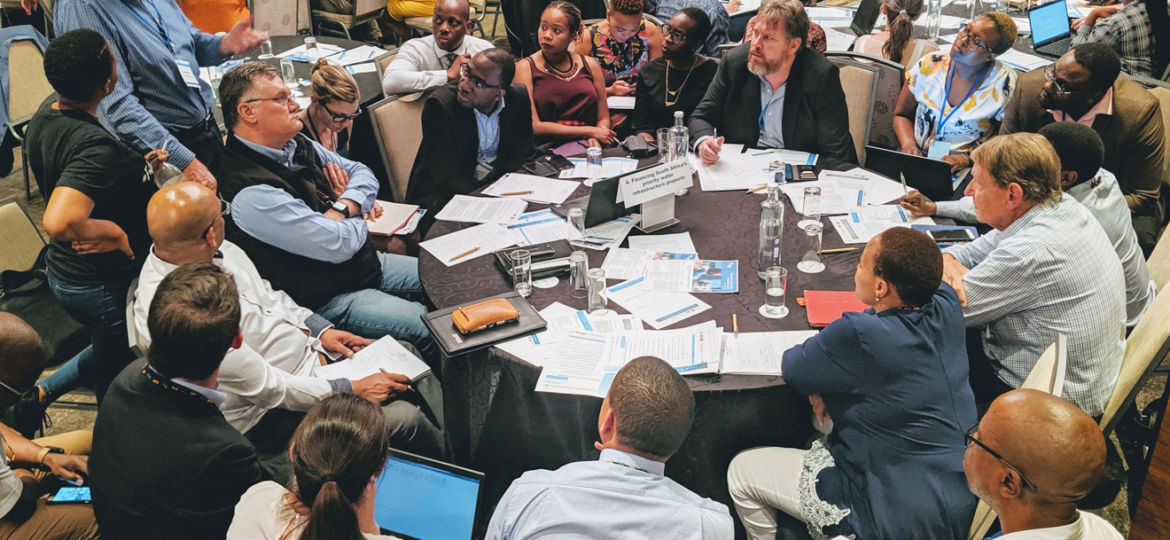
o value chain is stronger than its weakest link, and this is particularly true for the water sector–the value chain consisting of upstream supply chain, operations and downstream product use. But can a weak link be strengthened through partnerships? This is the question that guided the discussions of over 150 senior leaders from the water sectorat the 5th Annual Water Stewardship Event which took place today at the Crowne Plaza –Rosebank, in Johannesburg, South Africa. The event -hosted by the Strategic Water Partners Network (SWPN), the Natural Resources Stewardship Programme (NatuReS), the National Business Initiative (NBI), and the Royal Danish Embassy – explored strategies to further develop and test alternative water management and water delivery solutions to overcome some of the nation’s most pernicious water challenges and help meet the nation’s water service objectives.
According to the National Water and Sanitation Master Plan only 65 percent of South Africans have access to safe and reliable water services and 14.1 million people lack access to decent sanitation. Moreover, the South African water sector struggles with financial challenges and capacity restrictions, constraining its ability to bridge the service delivery gap. A lack of investment in South Africa’s water infrastructure and maintenance has resulted in 56 percent of South Africa’s 1,150 waste water treatment works and 44 percent of domestic water treatment works being categorised as being in poor or critical condition in need of urgent rehabilitation. The financing gap is partly explained by the fact that 41 percent of municipal water does not generate any revenue. The Department of Water and Sanitation (DWS) estimates that it will take R33 billion each year for the next 10 years to achieve water security, yet the budget for DWS is R15.5 billion–less than half of what is required.
The National Water and Sanitation Master Plan provides strong support and clear direction for the development of alternative, multi-partners service delivery solutions, stating that a “turn-around towards financial sustainability is not optional.”To overcome the sector’s challenges and meet water service delivery objectives, concerted efforts are required,and holistic and inclusive solutions are urgently needed from both the public and the private sector.
Speakers at the 5th Annual Water Stewardship Event presented transformative initiatives that exemplify how non-traditional actors are spearheading new models of collaboration. Moving forward,such approaches could be the key to unlocking new financing and overcoming the most obstinate obstacles to delivering reliable and equitable water and sanitation services to all South Africans. Discussions focused on three key approaches that demonstrated significant potential for impact and scale: public-private-partnerships, community and catchment-based approaches, and corporate water stewardship.
The scale of the crisis we face today is unprecedented, but it is a collective crisis, meaning that the consequences of inaction will affect us all
Public-private partnerships, or PPPs as they are commonly known, are long-term contracts between the public and private sector that require risk transfer to the private party. Beyond the normal functions that the private sector might take on, such as design and construction, PPPs extend into areas such as project financing, staffing, and the operation of specific assets. They are increasingly becoming a popular tool amongst public service organisations to secure efficient delivery and accessibility to public goods. Opportunities for deploying PPPs within the water value chain abound, and include, among others, desalination, any form of water reuse, groundwater extraction, and wastewater treatment.
There are three main categories of benefits that municipalities can leverage by deploying a PPP model, said Dhevan Govender, Senior Commercial and Business Manager with eThekwini Municipality, where a number of PPP projects are underway. “PPPs are the way to go to improve access to basic services, increase quality and efficiency of services, and mobilise capital,” said Govender,“the public sector has the vision, and the private sector has the technology and capital, and PPPs enable us to leverage that to deliver sustainable projects.”
Community-owned water solutions and catchment-based partnerships are another type of collaborative approach being successfully implemented across South Africa. While the specifics of each partnership may vary, they all incorporate some form of collaboration between communities, companies, and municipalities, sometimes at a river catchment scale, delivering a range of environmental, social and economic benefits and protecting precious water environments for the benefit of all.
Corporate water stewardship, which used to largely exist on the sidelines of business operations, has evolved significantly over the past decade from the realm of corporate social reasonability and emerged as a proven alternative model to address water security challenges beyond the fence line of a company’s operations. Given the realities of a warming climate and rapidly growing and urbanizing population, companies are being forced to think very hard about the context in which they operate.
“It has now become a business imperative for us” explained Nicole Solomon, Head of Corporate Social Development with AECI,a corporate partner of the Wise Wayz Water Initiative, a community-based programme that works with fence line communities in eThekwini to leverage clean, secure, and reliable water into livelihood opportunities.
Alternative water management and water delivery solutions that were experimental just a few years ago have today shown tremendous potential to address the country’s water challenges.Looking ahead, there is a need to take the lessons learned form these successful initiatives and move from demonstration to scale.
“The scale of the crisis we face today is unprecedented, but it is a collective crisis, meaning that the consequences of inaction will affect us all” said the Department of Water and Sanitation’s Chief Director for Regulations, Ndileka Mohapi. “Partnership is therefore of the utmost importance, and I would like to ensure that we move together to take the opportunity to work together as partners to leverage the full scale of benefits available to us to overcome this shared challenge.”

